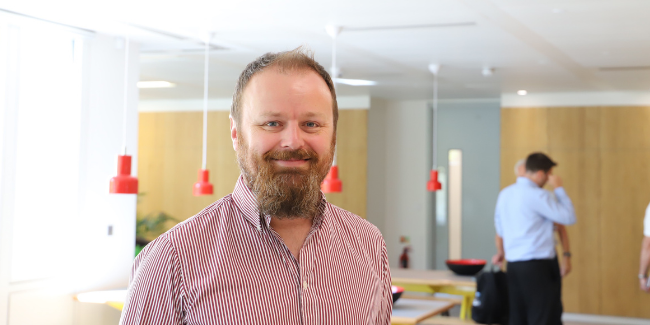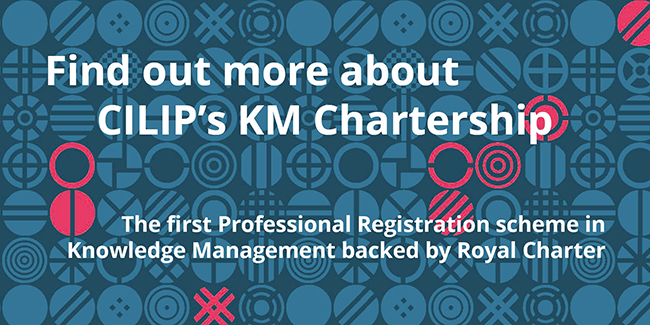
Rory Huston is Global Head of Knowledge for engineering consultancy, Cundall. He was one of the first Knowledge Management professionals to sign up for CILIP’s new KM Chartership and here he speaks to
Rob Green about how and why he decided to invest in his professional development by becoming a Chartered KM practitioner.
When CILIP launched a new route to Chartership for Knowledge Management practitioners, it handed those working in the sector an opportunity to look at professional registration in a specifically KM-focussed way. Rory Huston, Cundall’s
Global Head of Knowledge Management says he was keen to be part of the first wave of Chartered KM Practitioners.
He says: “Chartership is an expectation for engineers in my sector, with employers expecting you to go for chartership, as a signal of competence. Now CILIP has developed a route for my skills to be recognised alongside my engineering
peers, it was a no brainer to gain parity. In addition, as I have spent a lot of my career working either on my own or in a team of two or three KMers, I wanted to have my skills assessed by an independent body, to see if there were
any areas I needed to strengthen.”
Mentor
As with all of CILIP’s professional registration routes, there is help and guidance throughout the process, including support from CILIP staff and a network of mentors who work directly with candidates. Rory adds: “I found an excellent
mentor to help me through the process (thank you Keith!), and we started meeting regularly. I started writing up evidence sections on my phone on the way to work, but lockdown gave me the opportunity to crack on and get it completed,
and Keith helped me finesse and refine it. I have been supported by my company throughout, which has been helpful too.”
While KM Chartership is relatively new, professional registration itself is well established and CILIP has plenty of experience in helping candidates through the process. Rory says: “I was incredibly lucky to have a superbly helpful mentor,
Keith Wilson, who is experienced in CILIP Chartership, so could guide me through the process. He really helped me break down the process, encourage me, and keep me working on it one step at a time.
“He helped me to get a format for the evidence (what, so what, what next!), and to understand the concept of reflective writing. As the process went on, it became more valuable, as I started to see the value of what I had achieved, what
I had done, but what the gaps were. He also made me think hard about what sort of career I want to have, which has been a good focus point. I see KM as an accelerant for a company; it doesn’t necessarily design a product for clients,
but it helps ideas catch a light far faster; so if this is the case, what companies do I want to help accelerate? It was a lot of writing, and for poor Keith, a lot of reviewing, but we got there at the end. When lockdown is finished,
I owe him a big slap-up meal somewhere!”
Recognition
The idea that Chartership brings wider recognition of the skills KM practitioners have developed over their careers is a strong draw. In many industries, chartership is not just desirable it is expected. Giving KM practitioners a chartership
pathway helps to highlight professional equivalence between very different sectors – in Rory’s case Knowledge Management and engineering.

That comparison between engineering and KM is something Rory is all too aware of, as he explains: “For the first 10 years of my career I was an acoustic consultant, providing engineering consultancy to clients, including schools, offices,
transport buildings and TV studios. As an example, my last major project was the London 2012 Olympic broadcast Centre.
“Upon completion of the project, a one-year internal secondment came up into our KM team. It sounded fun, and I thought, ‘well, I’ll pop into that role for a year, fix a few things that would make my life easier, and go back to engineering’.
“The truth was though that almost immediately, I loved it. The opportunity to improve collaboration, support hundreds of people deliver better projects, and reach their potential, I have found so engaging. The great thing about KM is
how multi-faceted it is; every day is a learning day. In many respects, it’s an integration role, highly dependent on culture and context.”
Natural home
Until now, Rory has been “scavenging” his training and development from other organisations, but says CILIP’s commitment to Knowledge Management and its support of the discipline should see it become the natural home for those working
in the sector. He says: “I was learning from those around me, institutions such as APQC, KMI, the Henley Forum, nuggets from the now sadly defunct KIN network at Warwick, and LinkedIn. I wasn’t a member of any of these, so have been
“scavenging” for various nuggets of knowledge throughout my career! I did a particularly useful course, the KMI’s five-day Certified Knowledge Manager course a while ago, which was great for two reasons; namely it introduced me to
lots of concepts, some of which I knew, some I didn’t, but also being able to say ‘I’m a certified knowledge manager’ gave me increased confidence that I was competent.
“I’m very excited to have taken that on a step further forward with Chartership, which gives an independent accreditation from a UK-recognised institution. I’m also excited to see our President Paul Corney describing the desire to create
a home for KM in CILIP… no more scavenging!”
And while Chartership is important for an individual, it also adds value to an organisation. Knowledge management is a valued support to Cundall’s work, and to have an accredited KM lead can only increase the value of that service. Rory
says: “We have around 1,000 staff in 20 locations worldwide, from Belfast to Brisbane! Cundall provides design consultancy for the engineering elements of buildings, including building services, structure, fire engineering, acoustics,
and sustainability. With 20 different disciplines in the company, we have many people to join up. We have four big agendas at the moment in Digital Transformation, Sustainability, Project Management and Technical Excellence. The first
two agendas deeply affect both the service we provide to industry, and the company itself, so there are large change and programme management areas my work touches on, as well as KM.
“As you might imagine in such a complex business under change, much of the knowledge we deal in is tacit, and so we heavily leverage communities of practice and collaboration technology.
“Knowledge management is important for us to help win future work with clients. If the company is well networked. As an old HP quote goes ‘if only HP knew what HP knows’, KM helps the business offer clients the best of what we can do.
Good communities, and access to the knowledge we require when we require it helps us offer cutting-edge ideas to clients, without them necessarily being the guinea pig, as we might have executed the idea previously in a different market.
Healthy communities of practice also mean we can be more efficient solving difficult problems. At the end of the day, clients come to Cundall because they know we are a trusted, robust brand, which requires us to be able to leverage
our 40-years of experience in the field for them.”
So KM at Cundall can be felt both internally and externally – even if it is not always fully understood. “My clients are almost exclusively internal, and chartership is regarded highly by them. The field of knowledge management is often
new or at least murky to many. Having both the benefit of an ISO backing up our profession, and now Chartership helps to validate our maturing discipline. Some say KM really kicked off as a serious profession around the mid-90s, so
it’s about time.
“Primary for me, KM is about working with people to create frameworks and processes to make knowledge sharing more accessible. It’s 20 per cent about tech and 80 per cent about culture (I think I got that one from Chris Collison’s book
Learning to fly). However, when dealing with people, there are quite a few psychological elements in learning how groups work, how to give people autonomy to get things done, whilst having reporting frameworks etc.
“KM is, on the one hand, quite process driven, but on the other, it can be quite a freeform art to design around your company’s culture. Introducing KM can be about embedding deep cultural change, and typically change takes around two
years to fully embed, so it’s not a journey for the short-haul.”
Cultural change comes about in iterations, so it is perhaps not surprising that the work of knowledge manager sometimes goes unnoticed – and perhaps that is a mark of a successful KM strategy. Fortunately Cundall recognises Rory’s continued
contribution to the organisation, and even included news of his chartership on the company website, saying: “Cundall has a firm commitment to developing our people, and we also strive to provide our clients with the best possible
service, wherever they are in the world. We’ve invested in sharing our knowledge to make the most of the extensive insight and expertise all our staff have to offer, and we are proud that Rory has been recognised for his work in this
field. We look forward to continuing this work and enhancing the knowledge we deliver on every one of our projects.”
Chartership clearly brings benefits to an organisation and, in turn, helps raise the profile of knowledge managers and the work they do. But for those who go through chartership, there will also be personal benefits. Rory says of his
experience: “It’s quite interesting how chartership has opened doors in the KM community for me. Upon my announcement of being chartered, quite a few interesting KM leaders started connecting with me, and this in turn has led to a
much more interesting feed on LinkedIn, which I am learning from!
“I don’t know whether this is down to people recognising me as being a fully-fledged member of the KM community, or whether this is my own confidence. It’s funny, reflecting back (one of the things the Chartership process asks you to do)
I wonder whether I had been guilty of imposter syndrome in the early stages of my career. There are few if any fully-fledged KM qualifications out there, so chartership will put many of us on parity.”
Rory officially became the second Charter KM Professional (following on from Arup’s Elena Costello) and when asked if it is a route he would recommend to others, he is unequivocal. “Absolutely,” he says. “I think the process has helped
me think about my next steps, given me renewed confidence having my skills and achievements validated by my peers. Most in KM don’t get into it through a degree, but perhaps move sideways, falling or even tripping into it! Having
a bar for professional standards will be very important as we move into the next era of KM.”
Find out more about CILIP’s professional registration at
Professional Registration Chartership.
KM practitioners should visit Knowledge Management Chartership




